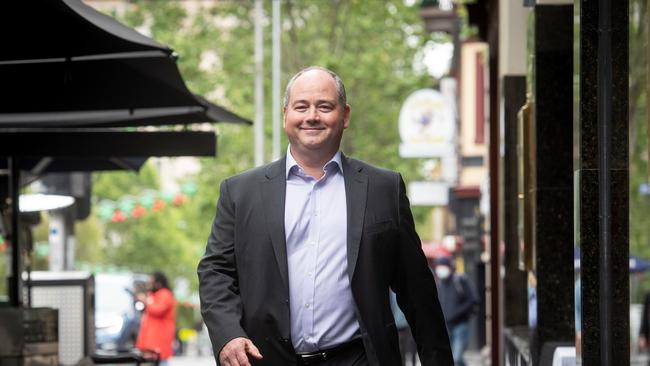NAB maintains a watching brief on borrowers, but is confident Australia will dodge a recession
NAB business and private banking group executive Andrew Irvine says a close eye is being kept on customers who are feeling economic pressure, but says business confidence is resilient.

Business
Don't miss out on the headlines from Business. Followed categories will be added to My News.
Troubled customers in construction and real estate are top of mind for National Australia Bank’s business bankers after the lender ruled off its $7.7bn full-year cash profit last week.
The NAB result, which saw the bank post an 8.8 per cent jump in full year cash earnings, was driven by the business and private banking division which returned a $3.3bn cash profit for the year.
This was up 10.1 per cent on the year prior, but inside the results NAB’s business bank saw a slide in second-half earnings, down 6.4 per cent on the first half of the year.
NAB business and private banking group executive Andrew Irvine said the lender was looking closely at its borrowers, but noted business confidence was holding up. Mr Irvine, who joined NAB in mid-2020, said “things are getting harder in Australia”, noting the bank was watching its borrowers in construction and real estate, with a focus on office assets.
“There’s no doubt that certain customers are having a bit more hardship but we are working with our customers helping them,” he said. “There is still a fair bit of business out there and it’s not all doom and gloom. While there are customers having a tough time there are many customers who are continuing to do well.”
NAB noted it was seeing “broad based deterioration across industries” with arrears in retail, trade, tourism, hospitality, entertainment, construction, energy, and commercial real estate tracking “above book average”.
Payments 90 days past due ticked up over the second half of the year to 0.64 per cent of the overall book. Provisions for losses from the business bank ticked up in the second half to $3.74bn.
Mr Irvine said NAB was “incredibly well secured” against many of its debts, with most borrowers tracking on low loan-to-value ratios.
The bank was working with borrowers who missed payments, restructuring debts, offering payment plans or holidays, or encouraging business customers to sell non-core assets.
Mr Irvine said many NAB customers were being slugged with costs increases due to inflation.
But NAB is not immune to higher costs, with the bank touting plans to save almost $400m in the coming year through productivity improvements, doing more with less.
Mr Irvine said NAB’s business bank was focused on the issue, with its latest move to start offering virtual cards to clients a sign of some of the areas costs can be clipped.
“Our budgets are the real focus, it’s about taking out some of our low value activities,” he said.
Mr Irvine said NAB’s business customers were not responding to inflation by upping loan limits, but some had extended working capital repayment terms as delivery timelines remained delayed.
“Inflation is a bigger driver of difficulties for business than interest rates,” he said.
Despite the rapid run up in the cash rate and slowing economic growth, few commentators are forecasting a recession or slump in the coming year.
Mr Irvine said NAB’s business bank was positioned far better than in previous decades for any downturn, with a much reduced exposure to commercial property.
NAB chief executive Ross McEwan said he was confident Australia would dodge a recession, but said inflation was staying too high for too long.
NAB has been transformed in the wake of Mr McEwans arrival, with the business bank a key focus for investment.
Originally published as NAB maintains a watching brief on borrowers, but is confident Australia will dodge a recession





